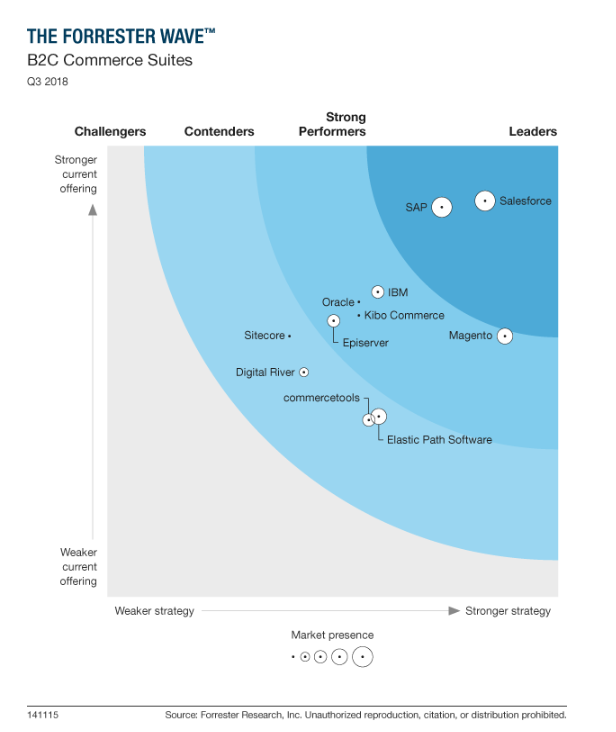Posted by: ClickZ
Posted on: 7/18/2019
Forrester evaluated and scored the top 11 B2C commerce suites in late 2018 in their Forrester Wave report. Top contenders were commercetools, Digital River, Elastic Path Software, Episerver, IBM, Kibo Commerce, Magento, Oracle, Salesforce, SAP, and Sitecore. Of those, SAP and Salesforce led the pack. What made them pull ahead of the rest?
Analysts looked at thirty-one criteria in their scoring. The report highlights three of the most important areas they weighed:
- Impactful experience, specifically driven by search, personalization, promotions, and AI-infused analytics. The report summarizes this as “the ability to target content and products with shopper incentives across the shopper journey.”
- Business user empowerment, considering not just functional capabilities, but how well a platform attracts and incentivizes customers and responds to shopper demands.
- Operational efficiency, looking at if the platform lets users easily upgrade versions with no recoding and minimal regression testing.
Content produced in collaboration with SAP.
Top-rated platforms were SAP and Salesforce
The report ranked SAP and Salesforce as “leaders” in the space.
IBM, Oracle, Magento, Kibo Commerce, and Episerver were all “strong performers.” Contenders included Sitecore, Digital River, commercetools, and Elastic Path.

The report also breaks down the analysis via a scorecard for each platform in some dozen categories spanning sales channel support, personalization, AI and machine learning, support services, and product vision, among others.
On this scorecard, both Salesforce and SAP scored a 5.0 (out of 5.0) in AI and machine learning. SAP earned a 5.0 in sales channel support and product vision as well, while Salesforce scored higher in personalization and business intelligence.
SAP offers a full-featured suite for enterprises
“SAP Commerce Cloud is a best fit for companies looking for an industrial-strength, full-function commerce platform in wide use across several industry verticals,” the report says.
SAP’s full-featured suite has a 50/50 revenue split between B2B and B2C clients, and “is equally adept at both,” Forrester writes.
They also note that the company has invested heavily in its cloud strategy, and is reaping the benefits of doing so: “half of its 2017 commerce revenue came from its cloud offering,” they note.
Forrester also mentions SAP’s “outstanding enterprise customer references who reported seamless scaling and load management for billion-dollar GMV loads.”
According to one such glowing review from an enterprise customer, “We can ramp to a million transactions a day with no concerns; the platform is rock solid and enterprise-ready.”
Salesforce also a leader but with a shared revenue model
Salesforce B2C Commerce has long been another major player in the retail digital commerce space, supporting over half a billion unique monthly shopper visits across the globe.
The report does find the platform isn’t without drawbacks, though. For example, Salesforce B2C Commerce’s coding customization is more expensive than for other platforms.
Analysts note that Salesforce’s option would work for retailers that are “looking for an out-of-the-box cloud solution and are willing to accept a shared revenue model.”
What could the “strong performers” do better?
Adobe’s Magento is among the next best platforms, according to Forrester’s report. It’s a “best fit for clients that are looking to customize their solution, value the open source model and its extensive ecosystem, and want an affordable alternative,” analysts note. However, some of its features remain “substandard,” including weak native content management tools, slow indexing, and search results lacking in relevance.
IBM’s commerce suite also ranks highly in this report, though analysts write that its “ comprehensive, if unwieldy, solution needs to modernize more quickly.” The fact that they’ve been a presence in the enterprise commerce market since the 1990’s — and that they’ve been continually adding functionality since then — has led to their platform being full-featured but also “large and cumbersome,” the report observes.
Oracle’s Commerce Cloud is a bit newer to the market — the platform has only been live for two years (as of Q3 2018) and “is still gaining adoption, reference customers, and stability,” the report finds. At the same time, Forrester remarks that the platform has strong potential, particularly when linked with the Oracle Data Cloud.
Kibo Commerce is one of the smaller vendors mentioned in this report, with a primary focus on the North American market. On the positive side, Forrester notes that customers “liked working with a responsive, small vendor,” and that price was a strong selling point. On the other hand, customers voiced concerns around stability and “rudimentary” analytics capabilities, as the platform is still maturing.
To read more analysis on B2C Commerce Suites from The Forrester Wave, download the full report here.
The post Forrester B2C commerce suites: What made the winners stand out appeared first on ClickZ.

